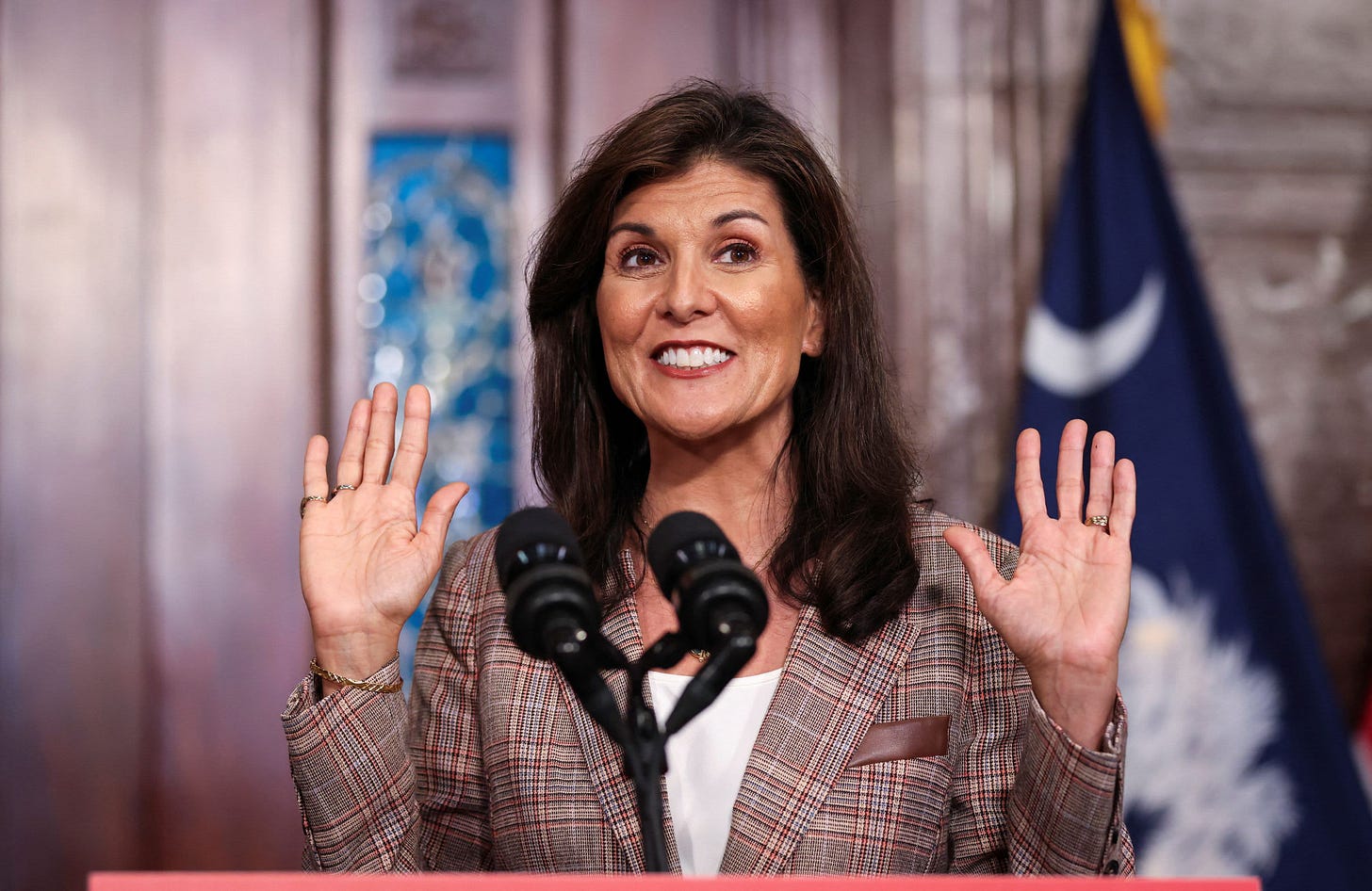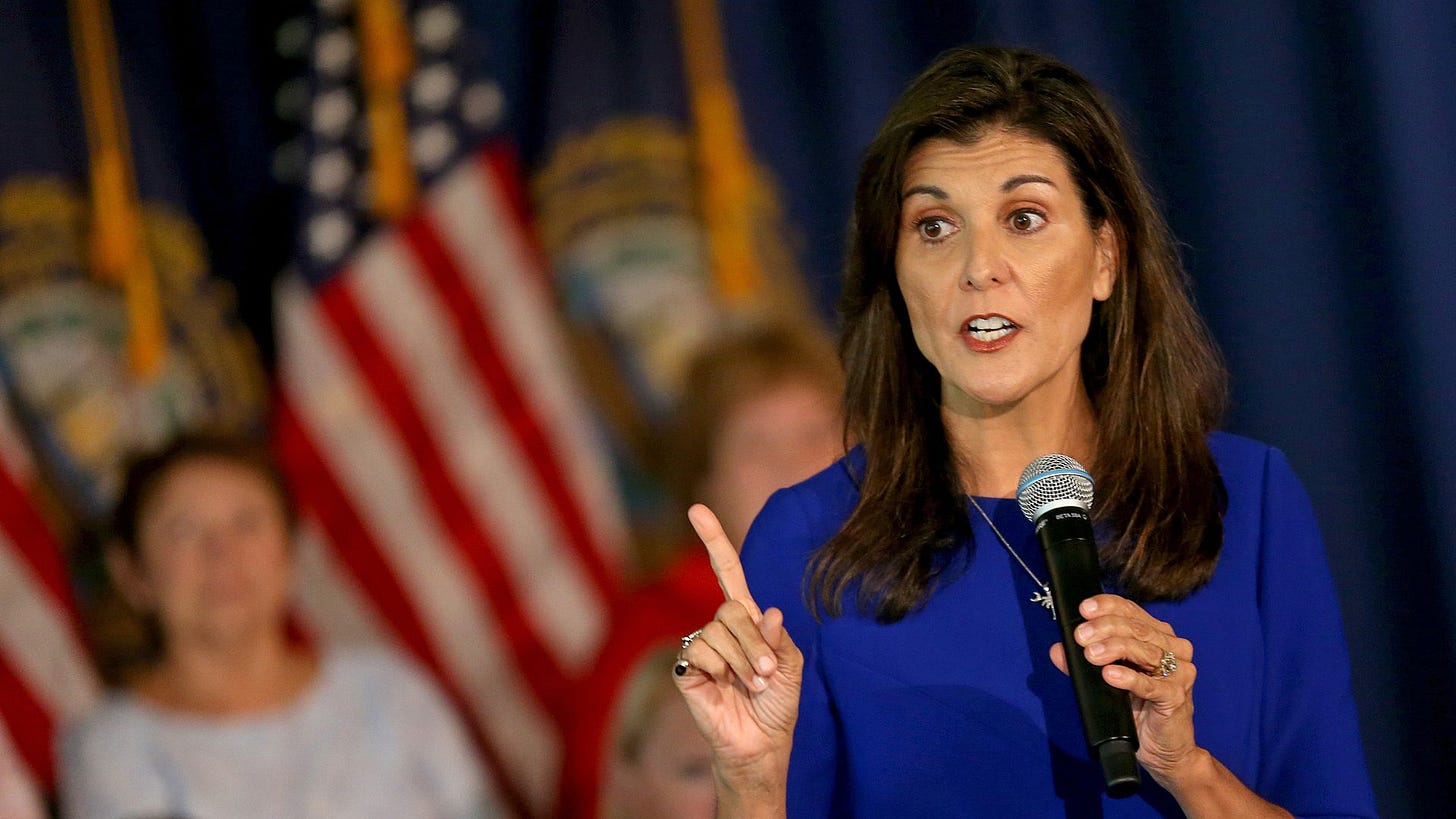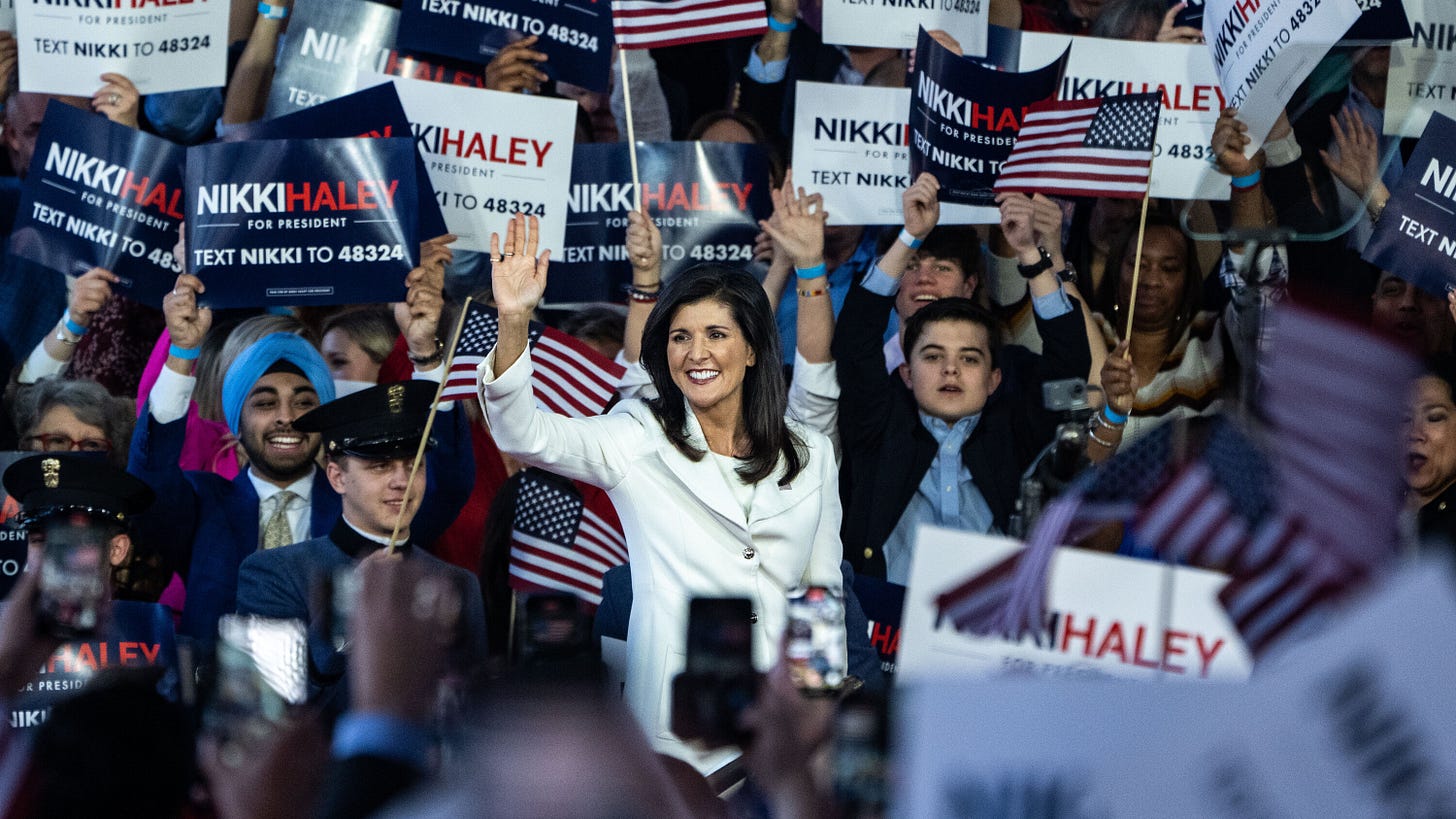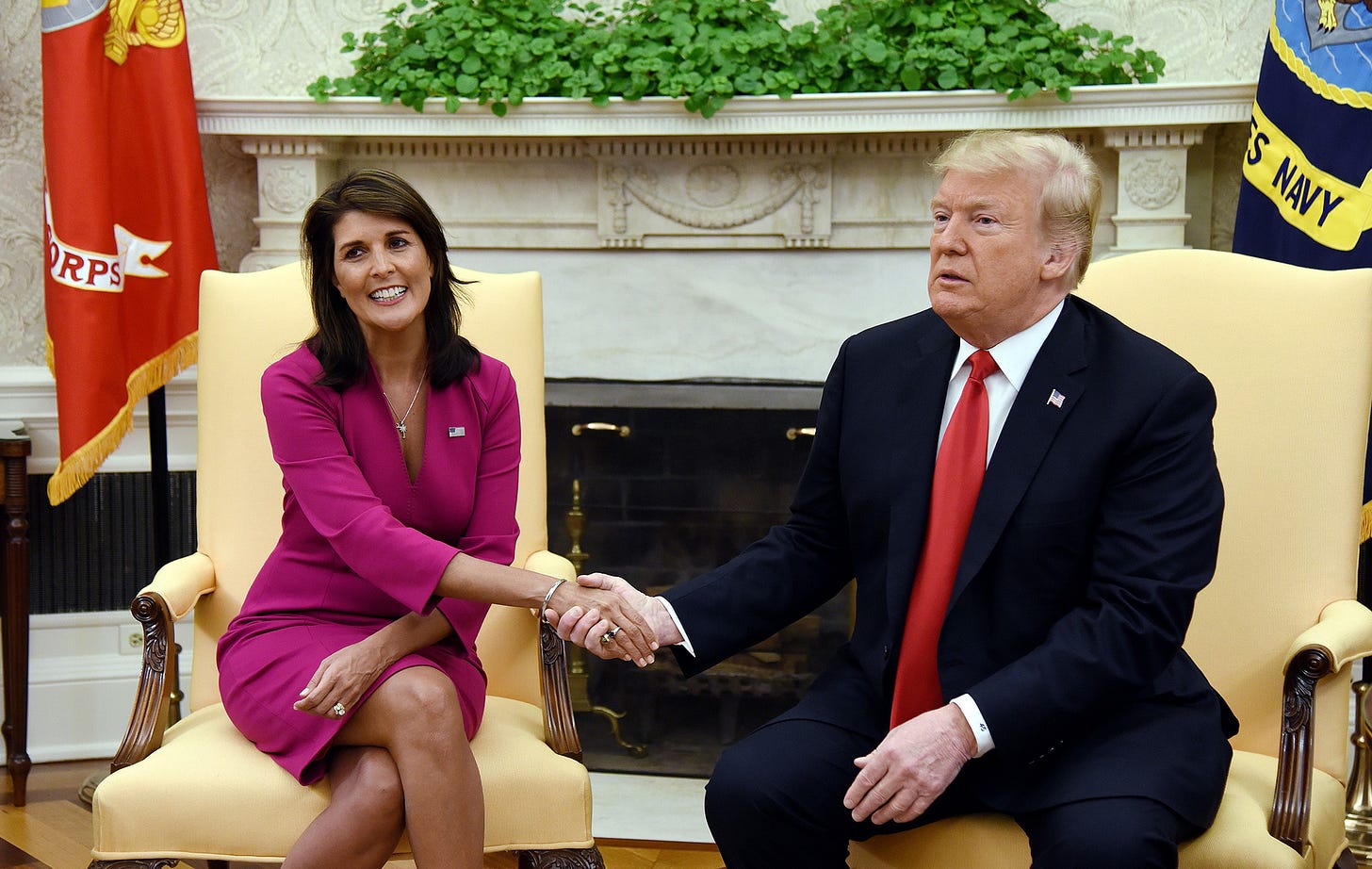How many South Carolinians does it take to run for President? Just one now.

Nimarata Nikki Haley is a former Governor of South Carolina, former Ambassador to the UN and one of 2024’s youngest candidates for President. She also happens to be the second most likely GOP nominee besides former President Trump, and that should be setting off alarm bells for Democrats. As of right now, she is the strongest candidate in General Election polling against Pres. Biden, consistently leading by mid-single digits against the incumbent President. This article will get into the meat of Haley’s campaign, how she’s found success in the primary as of recently and whether or not she should be seen as a serious contender to Donald Trump for now.
Strap in, and come join us on a journey to see how the last South Carolinian standing could become the first ever Asian-American President.
First In, Last Out?
Nikki Haley was the first major candidate to declare her candidacy for the GOP nomination after Donald Trump officially entered the race at the end of 2022. In the following February, Haley would take to the stage in her native Charleston to tell the world she was running for President, but there was little fanfare around this decision. Many knew that she had been pitching herself as a candidate since as early as 2020, and her campaign announcement was all but a foregone conclusion - which may be why her polling numbers remained stagnant before and after her official entry into the primary.
For many Republicans, Haley’s campaign was a breath of old air, with her being pitched by many as the “neo-conservative,” or “Reaganite” candidate in the room due in no small part to her foreign policy credentials. While many in the race, including Trump, have taken a lot of non-interventionist positions in the primary, Haley is seen by most as a full-throated war hawk. Opposing Biden’s withdrawal from Afghanistan, committing to aiding Ukraine in any way possible in their fight against Russia and stating that Israel has the right to, “finish them,” in regards to Hamas and that the US should support Israel in this plight.
Her more interventionist positions in this primary have put her at direct odds with the populist forces who have consumed the GOP, many of whom are against US involvement overseas. They seek to prevent any expenditure whatsoever to defend foreign allies against existential threats, such as Ukraine against Russia. Vivek Ramaswamy (R-OH) is a flagbearer of this movement and notably stated that the US should halt their support of Ukraine, and that he would also block any attempt by Ukraine to ascend to NATO should he win the presidency. Ron DeSantis (R-FL) has also taken this position. However, this may indicate how little GOP primary voters actually believe in this non-interventionist doctrine since DeSantis and Ramaswamy are only polling at around fifteen points between them yet are the loudest voices on the matter.
Her potential biggest rift with her Republican rivals however is over abortion, with Haley initially taking the most, “liberal,” approach against her all male rivals - although she has recently flipped on this issue. Previously, Haley had stated her support for the fifteen-week ban proposed by her fellow South Carolinian, Senator Lindsay Graham (R), seeing this as a consensus option in the aftermath of the repeal of federal abortion rights. However, in recent weeks, Haley may be sensing blood in the water and has taken a hard line against abortion by announcing her support of a six-week ban on abortion at a campaign event in New Hampshire, going so far as to say she would have supported such a measure if it came to her desk as Governor of South Carolina. In doing so, I suspect that she is attempting to bolster her traditional conservative credentials as Sen. Tim Scott (R-SC) recently withdrew from the race and enjoyed support from many of Haley’s potential voters. At the same time, Gov. DeSantis is falling into single digits, so it seems likely that Haley is attempting to coalesce the support of non-Trump voters who disagree with Trump’s more liberal attitudes towards abortion, as the former president has stated his opposition to the six-week ban a number of times.
All of this is to give a quick rundown of Haley’s positions this campaign which have separated her from her rivals, and helped bolster her recently to climb into second place in a number of polls. Should her momentum continue, she will set up a heads up contest with former Pres. Trump which would almost perfectly pitch the old neo-conversative right of Haley against the new, populist right brought into the fray by Trump back in 2016.
Bad for Biden
With a little about her campaign out of the way, it shouldn’t be too difficult to understand why she would be a real threat to Biden and Democrats in general should she secure the GOP nomination.
Many Americans yearn for the days of the “sensible, moderate GOP,” which was gutted by Trump’s victory seven years ago and Haley is the last vestige of that movement. She embodies much of the policy of Bush’ Sr. and Jr. along with a hint of Reagan and this mixture has made her greatly popular with a broad swathe of the electorate. As of right now, polling aggregator RealClearPolitics has her four points of clear of Biden, and Trump two points clear suggesting that a number of swing voters that find Trump unconscionable would vote for the different type of Republican Party which Haley represents. This is also reflected in her favourability polls, showing her as one of very few national politicians with a positive approval rating among all Americans.
It does, however, feel irresponsible to gush over Haley’s chances against Biden without a pinch of salt. That pinch of salt being that she has had to scrap a large part of her moderate image in a desperate appeal to GOP primary voters, who are still keen to back the furthest right, loudest candidate they can find. Her past choices such as opposing a transgender bathroom ban as Governor of the Palmetto State and the rest of her personal background serve as somewhat of an anathema to the modern Republican base, yet to win them over she has to alienate herself to the political centre. For every DeSantis voter she wins by deriding critical race theory or the LGBTQ+ agenda, she loses one fence-sitter come November 2024. If she actually can tackle Trump in a heads up affair then you can expect plenty of clips to be produced of her opposing wokeness or whatever other buzzword is on the conservative mind that day.
Furthermore, Haley being the GOP nominee would require her to either beat Trump in a brutal primary, or the former President being disqualified from running due to his legal qualms. Both of these scenarios would be uniquely harmful for Haley as the first would likely entail either Trump launching a third party bid or further right Republicans backing someone like RFK Jr. en masse. Trump being disqualified from running would probably be less harmful for Haley’s campaign, but would shake public opinion of the Republican party even more so than it already has been. This could vastly limit her crossover appeal and would naturally aid Biden towards a second term.
For now, it is safe to conclude that, one year out from election day, Haley comes across as the strongest GOP candidate and would likely be favoured against Biden in a General Election. But there is so much which can change between now and then that would diminish her strength. Whether it be a brutal primary against Trump, to her rhetoric being spun against her, there are a great number of roadblocks in Haley’s way to becoming president should she even clear the primary.
Primary Pandering
Continuing from the end of the last section, the question of actually winning the GOP nomination is what lingers most imminently over Ms. Haley. As of writing she is polling a commendable ~10% according to FiveThirtyEight’s polling tracker, which places her just two points behind Gov. DeSantis. However, dear reader, to beat DeSantis is to take second place and right now Trump is polling at a massive sixty percent, meaning that, at the bear minimum, Haley would need to increase her share four-fold to match the former President’s numbers. Right now, this feels insurmountable but I will explore below how she may be able to overcome this huge deficit despite the Iowa caucus being just seven weeks away.
Iowa will be the first testing ground for Haley, and she wouldn’t have to see a massive improvement from her current standing to potentially pull off an upset in the Hawkeye State. Naturally, Iowa has been in the crosshairs of almost every candidate - barring Chris Christie (R-NJ) since way before the election cycle even began. It is the first test of each candidate’s strength and a win in Iowa can cause enough momentum for even the longest shot candidacies to show their potential of winning the whole primary.
Currently, the three frontrunners in Iowa are Trump, DeSantis and Haley averaging forty-five, seventeen and fifteen points respectively as of today. Exactly one month ago, Trump was doing five points better than he is now, DeSantis hasn’t changed and Haley has gained five points in just a month. It’s unclear which candidate Haley benefitted from and Trump lost out to, but what is clear is that Haley certainly has a sense of momentum around her campaign, since she’s the only candidate to have made steady gains over that period. Should she continue at this rate, then she may be touching thirty or so percent of the vote come mid-January when Iowans go to vote - and that could well be enough to eek out a victory since Iowa is often won with less than thirty percent of the vote (see 2016 for the GOP and 2020 for Democrats).
If Haley were to win Iowa, then the whole race would be flipped on its head and would be wide open for her to win especially given her strong numbers in New Hampshire and her native South Carolina.
The other way Haley could win is through a general shift of fates that some pundits have suggested is occurring behind the scenes. Notably, the New York Times recently reported that a number of big GOP donors have been warming to Haley including billionaire Kenneth Langone of Home Depot wealth, who has stated his preference for the former ambassador over Trump. For many wealthy Republican backers they see Haley as the non-controversial option who will be good for business and less prone to being the loose cannon which a second Trump presidency would be.
Should she continue gaining momentum over the coming weeks leading up to the Iowa caucus, then it is entirely reasonable to assume that she will see an influx of cash and support behind the scenes, which could then translate into popular support as voting begins. New Hampshire is also a potential saving grace for Haley, as she is already in second place, polling at 20% in the Granite State which could certainly translate into a win should her momentum hold. If I’m honest, this feels like a pipe dream, but stranger things have happened. There is an undercurrent of GOP supporters and donors who dislike Trump yet would bite their tongues to vote for him in 2024, but they would really rather someone of a more Reaganite persuasion, i.e. Haley. If she begins to show promise, it wouldn’t be farfetched for them to begin throwing their weight behind her candidacy which could snowball into an outright primary win, but I would still place her odds in the single digits.
Wrapping Up
I hope you have enjoyed this trip on the Haley Express to best guess how she could potentially become the next President of the United States. It is a fraught journey which requires her to beat a former President who has one of the fiercest backings in American history, and then unseat an incumbent President thereafter. Before you go, I want to reiterate that this article wasn’t to stipulate that Haley will win the GOP nomination and then the presidency. Rather, it is to illustrate her strengths as a candidate and acknowledge the diminishing window in which she could secure the presidency within. The road is narrow, has plenty of twists and turns, is poorly lit but there is always a statically significant chance of success.
If you’ve made it this far, thank you so much for reading and consider sharing this piece with a friend!








Yeah, it very much feels like she's positioning herself to not necessarily BEAT Trump, but more to be what happens after he's done. That might be because he served his second and final term (leaving aside apocalyptic dictatorship stuff), might be because he's disqualified, leaves in a huff, or any number of other possibilities.
If that happens, then there's going to be an appetite for a different kind of Republican, and she's trying to position herself that way instead of going for DeSantis' "not Trump but Trumpish" positioning. That's smart, as DeSantis is proving that doesn't work.